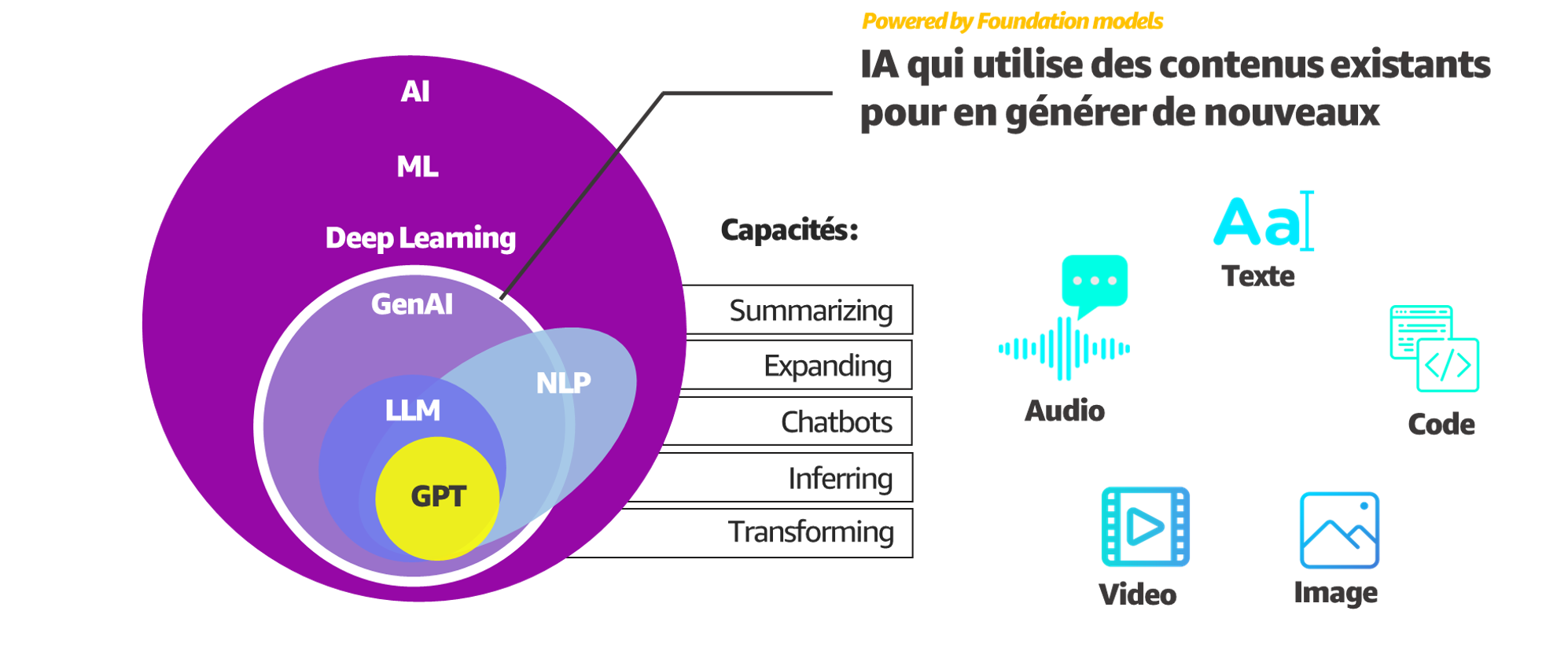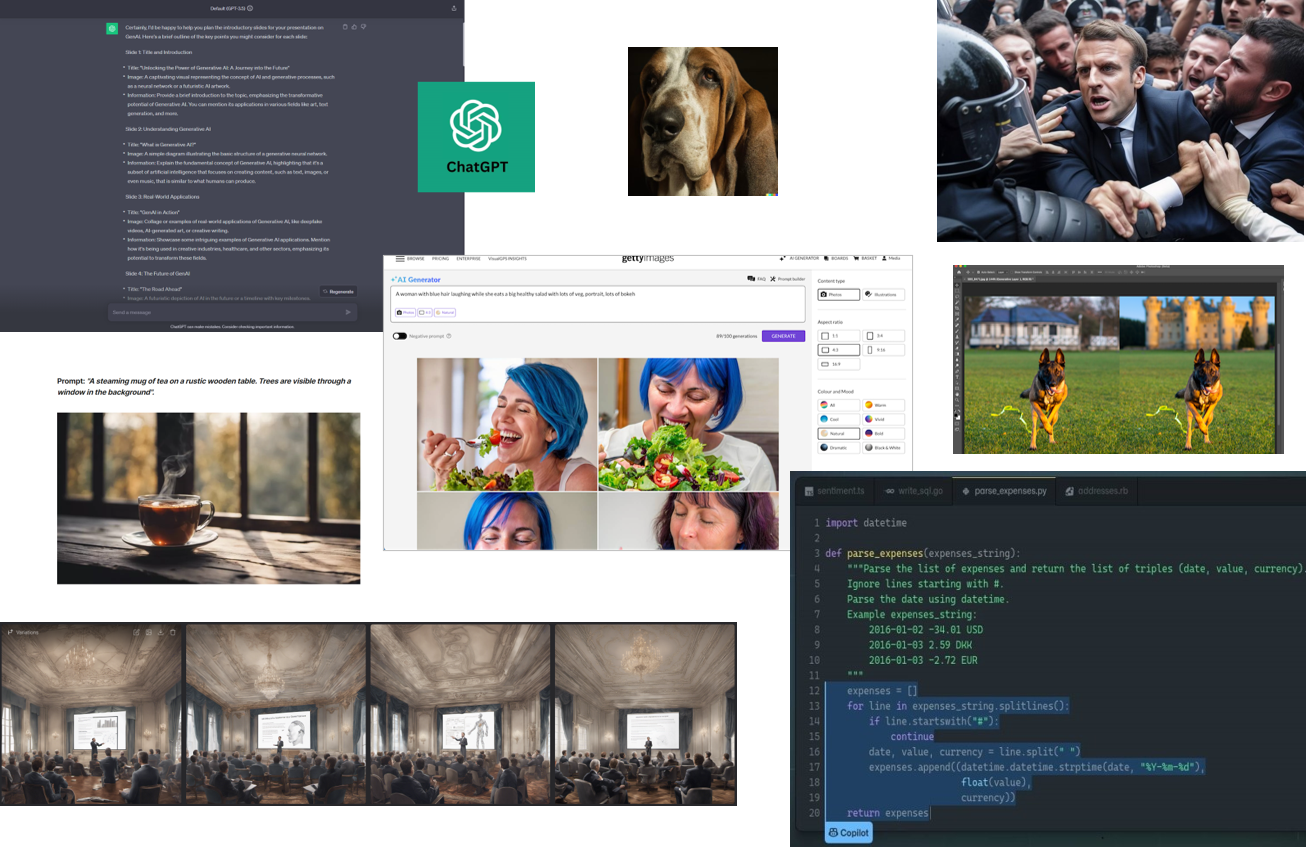Generative Artificial Intelligence (GenAI) is emerging as a major transformation catalyst, transcending its initial status as a tool to become an essential partner in redefining businesses. Throughout this evening, several renowned speakers such as SG, Thalès, LightOn, and DeepLife, highlighted the growing importance of GenAI in the professional landscape, emphasizing its central role in business transformation. Experience sharing was the cornerstone of the evening, making these moments the heart of the event.
Artificial Intelligence (AI) has undergone remarkable evolution, progressing from rudimentary algorithms to sophisticated machine learning models over the years.
Today, a new exciting chapter unfolds with Generative AI (genAI). The history of AI dates back to the mid-20th century, evolving from rule-based systems to neural networks, and then to deep learning models. Generative AI represents a major advancement by creating new data rather than simply responding to existing ones.
This innovation opens revolutionary opportunities for all businesses and sectors. GenAI goes beyond the limits of what machines can create, offering transformative potential for innovation, solving complex problems, and personalization. Already used in sectors such as entertainment, retail, and marketing, this technology promises a future where AI creativity complements human innovation. The horizon of Generative AI heralds an exciting new era for business professionals and knowledge workers.

Side note : Focus on LLMs
As a flagbearer of Large Language Models (LLMs), Chat-GPT has popularized generative AI that has been in existence for a few years. Trained on immense volumes of data, these neural giants often surpass 100 billion parameters and demonstrate remarkable versatility, ranging from writing to code generation. The largest among them are what are called foundational models that can be used as is or adapted to solve more specific tasks.
Some renowned foundational LLMs: GPT, CLAUDE, BARD, LLAMA, TITAN, PALM
Generative AI in a few examples: Conversational agents, deepfakes, image generation based on description, augmented photo editors, assistance in software development.

Among the existing tools in the GenAI universe, we find:
- ChatGpt, Claude, Bard, Llama, Palm: LLMs that have recently become very popular
- Copilot, CodeWhisperer, IntelliCode: code assistants for developers. Capable of building entire functional code snippets or even entire projects for operational efficiency
- DallE, Midjourney, Stable Diffusion, Firefly: on-demand image and video generation. Particularly, massively used in the marketing sector.
Meta-trends of Generative AI
- Emerging GenAI and AI: difficult to predict the future. Gartner positioned GenAI at the top of its annual cycle of emerging technologies in 2023 to achieve transformational benefits in the next two to five years. Surprising when in 2022, the metaverse was the leader in their reports...
- "AI TriSM" enterprise-wide strategy for AI trust, risk, and security management. Within 2 to 5 years, GenAI security will be fully integrated into organizational digital design.
- Federated machine learning and neuro-symbolic AI
- Cloud and GenAI
- New paradigms will make AIs even more relevant, notably by incorporating logical reasoning and multi-agent (multiple AIs communicating with each other).
- Cloud platforms will facilitate the development of Generative AI.
Shared experiences
Large Language Model for Code
The growing maturity of Generative AI, notably with the release of ChatGPT in November 2022, opens up new perspectives in terms of operational efficiency. A project is underway to soon provide Github Copilot and a ChatGPT SG, a hybrid and particularly advanced in the use of generative AI for nearly 25,000 IT professionals, including 10,000 developers. User feedback is positive, and an increase in operational efficiency has been observed.
Jean-Baptiste Morlot, Co-Founder & CTO
Digital twins of cells for drug discovery
The integration of Large Language Models in the field of research dramatically transforms the landscape of innovations. A shared feedback on cellular modeling reveals a revolutionary transformation in the field of medical research. These technologies drive an unprecedented acceleration in the discovery of innovative treatments.
Julio Lopez, CIO for Group Data & Digital Foundations
Large Language Model factory
LightOn stands out in the development of large language models, with a track record of creating models ranging from 1 billion to over 100 billion parameters. Feedback on developed LLMs by presenting their flagship offerings such as Alfred, which distinguishes itself with its advanced linguistic capabilities, and their Paradigm platform providing organizations with customized GenAI solutions easily integrable into their infrastructure.
Benoit Bouffard, CPO / CMO
Digital identity & security Generative AI
Within the Cloud Center of Excellence and supported by GCP, a GenAI service platform was created in 6 months with only 3 experts to manage the project end-to-end. Feedback on the obstacles encountered during the integration of such an architecture: data security and quality, performance, reliability of LLM responses, "jailbreaking" of language models, and many more.
Thomas Dandelot, CCoE Cloud Engineer
Various points of convergence of present CIOs
- Operational Transformation: Optimization, efficiency, and cost reduction
GenAI will affect all operations (banking, insurance, others) by optimizing every aspect of processes with the goal of increasing operational efficiency while reducing associated costs. - Ethics and Regulatory Compliance
Organizations must ensure compliant use with strict regulations while upholding high ethical standards. Transparency in deploying these technologies becomes crucial to gain the trust of users, customers, and regulators. - Evaluation of AI Models: Criteria, performance, and costs
Understanding evaluation criteria, analyzing performance, and assessing implementation costs are crucial elements to ensure optimal selection and reliable results. - LLM Security: Privacy and data protection issues
Ensuring data confidentiality, protecting the intellectual property of generated code, and preventing information leakage risks are top priorities for CIOs. - Role of CIOs: Leadership in LLM adoption
The role of CIOs is central in the adoption, integration, and management of LLMs within organizations.
How to ensure appropriate leadership for successful implementation of these technologies? - Sustainable Development and LLMs: Environmental impacts
How to reduce the impact of LLMs while leveraging their potential for a more sustainable financial future? - Team Training and Adaptation: Skills and integration challenges
CIOs must address challenges related to skill development, change management, and creating an organizational culture conducive to the adoption of these emerging technologies. - Collaboration and Partnerships: Keys to LLM adoption
Strategic collaborations and partnerships between companies and technology players are essential for successful LLM adoption. How to foster these alliances for optimal use of these technologies?
Generative AI represents much more than a mere technological advancement. As companies move towards this transformative era, CIOs emerge as key players, tasked with defining the strategic direction of AI in their organization. The observation that few organizations have established clear principles underscores an urgent need for guidance. The coming months will be crucial, as companies must rise to the challenge of defining clear AI ambitions while anticipating the economic, social, regulatory, and ethical implications of this technology.




